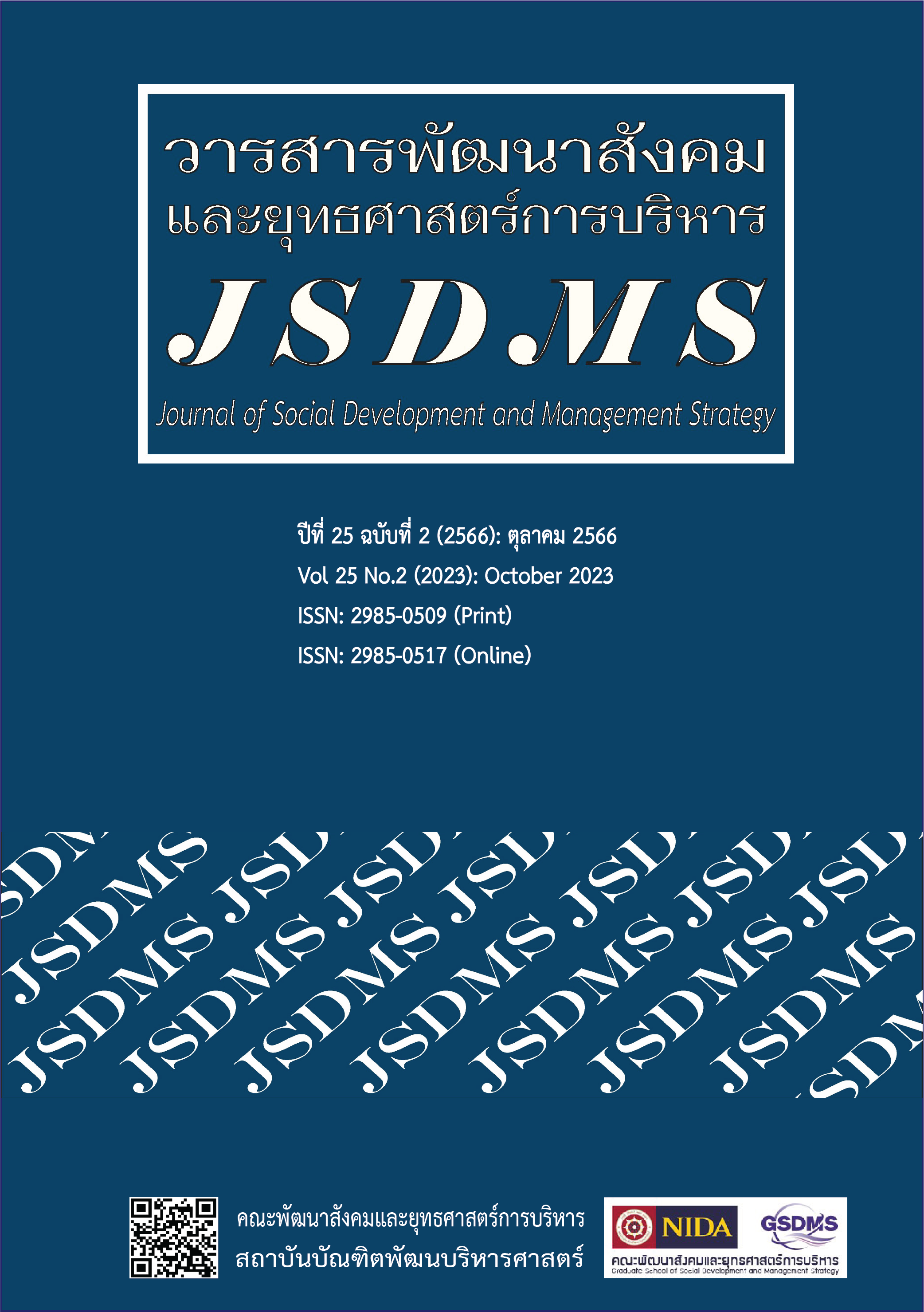BCG economy model with Well-being and Happiness Index
Main Article Content
Abstract
This article delves into the economic model of the BCG (Bioeconomy, Circular economy, Green Economy) within the framework of Critical Theory, primarily focusing on the policy voids that persist in the unarticulated aspects of the operative plan. The model is formulated as a policy instrument geared towards the equitable redistribution of income, opportunities, and inclusive economic growth. Furthermore, it is a public policy that holds the potential to authentically confer happiness and sustainability upon the people. The objectives of this paper are as follows: (1) To study the documents entitled “The Action Plan for Driving Thailand Development with the BCG Economy Model 2021 – 2027” and information published on the website: www.bcg.in.th which is the main digital communication channel. (2) To study and compare the continuity of the BCG economy model (2021-2027) and the Yu Yen Pen Suk Index (Thailand Happiness and Well-Being Index).
From the study, it was found that although the document states that it is an action plan for driving the BCG economic model, there are still only details at the policy level. The action plan has not yet been detailed. When considering the consistency of the BCG economic model with the Yu Yen Pen Suk Index There is consistency in domain no.4 (a strong and fair economy), the third domain (strong community) and the fifth domain (a good environment and a balanced ecosystem) only. The dimension of social structural reform is missing. Whether it is domain no.1 (well-being) even though there is a strategic branch 2 in health and medicine. Which is the only relate to the physical health. It has missing to do with mental health, morality, ethics, intellectual development, and the pursuit of knowledge. The domain no.2 (being a warm family) and domain no.6 (democratic society with good governance) that miss from policy and operating documents.
Article Details

This work is licensed under a Creative Commons Attribution-NonCommercial-NoDerivatives 4.0 International License.
References
Agricultural Land Reform Committee. (2011). Proposal for agricultural land management reform [in Thai]. Bangkok: TQP.
Anan Ganjanapan. (2000, November). Farmer's rights and resource management for sustainable development [In Thai]. Retrieved from
http://www.mcc.cmu.ac.th/Seminar/pdf/669.pdf
Bank of Thailand Learning Center. (2018, December 14). Tom Yum Kung Crisis in 2540 [In Thai]. Retrieved from
https://www.botlc.or.th/item/kc_recommendation/00000000014
Bank of Thailand. (2022, July). Headline inflation july 2565 [In Thai]. Retrieved from https://www.bot.or.th/Thai/MonetaryPolicy/Pages/OverviewInflation.aspx
Cabinet and Royal Gazette Publishing Office. (2008). Thailand cabinet policy statement [In Thai]. Bangkok: Cabinet and Royal Gazette Publishing Office.
Chalermchai Kittisaknawin, Kosin Techaniyom, Wutthichai Arakpothchong, & Worapol Pinit. (2563). Causal factors influencing the income distribution of middle income cointries and the relevance of governance indicators: International approaches to reduce inequality in Thailand [in Thai]. Bangkok: King Prajadhipok's Institute.
Ministry of Higher Education, Science, Research and Innovation. (2022, February). Bio-circular-green economy action plan 2564-2570
[In Thai]. Retrieved from https://www.bcg.in.th/bcg-action-plan/
Office of the National Economic and Social Development Council (2007). Supporting documents of the green and happiness in Thai society 2550 [In Thai]. Bangkok: Office of the National Economic and Social Development Council (NESDC).
NESDC. (2018). Thailand's 20-Year national strategy [In Thai]. Retrieved from http://nscr.nesdc.go.th/ns/
NESDC. (n.d.). The national economic and social development plan [In Thai]. Retrieved from https://www.nesdc.go.th/main.php?filename=develop_issue
Pakdee Rattanamuk. (2018). Thailand 4.0: Discover Thailand? [In Thai]. Bangkok: Panyachol Printing.
Pichai Ratnatilaka Na Bhuket. (2016). Critical theory [In Thai]. In Philosophy of social science: Foundation of social paradigms for social science research (2nd ed., pp. 173-188). Bangkok: Bangkok Block.
Puey Ungphakorn Institute for Economic Research. (2020, July 15). In depth analysis of Thailand three-decade-inequalities episode 1
[In Thai]. Retrieved from https://www.pier.or.th/abridged/2020/17/
Royal Gazette on the Issuance of Community Title Deeds B. E. 2553. Royal Thai Government Gazette, 127, 73 (11 June 2010), 1-4.
Suvit Maesincee. (2020, May 21). The world is changing; people are adopting: From breaking the traps to sustainability [In Thai]. Retrieved from https://www.nstda.or.th/home/knowledge_post/the-world-changes-people/
Thailand Science Research and Innovation. (2020, September 12). TSRI virtual forum 2563: EP.02 inequality time bomb national development traps [Video file]. Retrieved from https://www.youtube.com/watch?v=JzQTUivcm8s
The National Science and Technology Development Agency. (2021, February 6). Bioeconomy [in Thai]. Retrieved from https://www.bcg.in.th/bioeconomy/
United Nations. (2558). Transforming our world: the 2030 agenda for sustainable development. Retrieved from https://sdgs.un.org/2030agenda
Yos Santasombat. (2004). Ethnic ecology biological resources and community rights [In Thai]. Chiang Mai: Within Design.


